Question
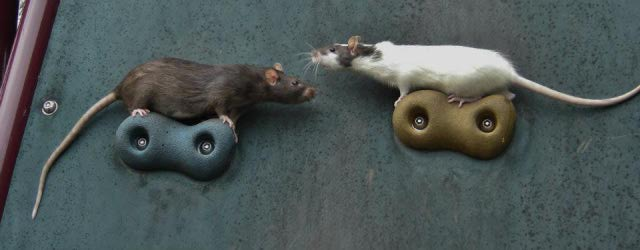 Trudy and Snowflake
Trudy and Snowflake 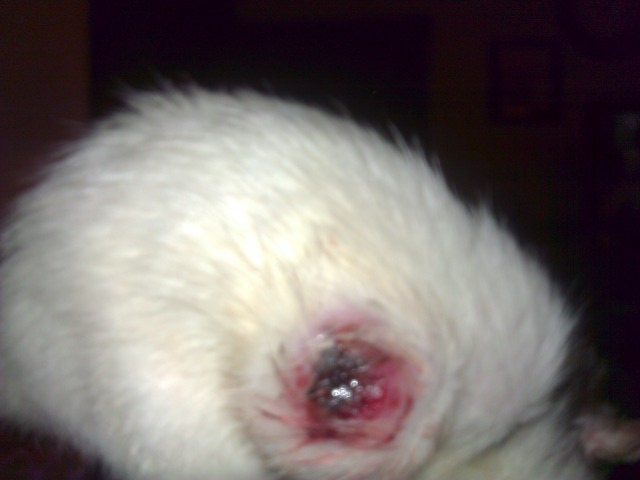 Snowflake's Abcess
Snowflake's Abcess
I bought an (approx) 3 month old rat in Jan 2011, she died of the exact same problem as the writer Lola wrote in, exact same symptoms. She had a strong will to live, and after having like a "stroke"(ran around the cage screaming for a minute) was never the same. That was August 2012 and she passed Jan 10 2013, very thin.
I got Snowflake in June 2011, she was very young, and at first Trudy hated her (they became best friends later, Trudy was jealous of any animal who got my attention). Snowflake has a tumor, above her left arm, and it's HUGE now (can't do anything financially) and even worse, a tumor that was like a big cyst that burst and now is an abscess the size of a quarter. Her behavior, until today, hasn't changed a bit, playful, loving, smart, now today she's begun whipping her tail. I have been putting watered down antibiotic on the wound and it seems to have closed it up nice. I am going to be SO upset when she crosses the bridge.
I love having rats. I keep their cages clean. My chinchilla I've had for years is in perfect health. I give them PLENTY of attention. I can't keep going thru this every 2 years. Is it that different with males? How can I keep these sweet animals alive longer?
AnswerI am so sorry about your baby Snowflake's tumor. I've gone through many tumors with my female rats so I empathize with you. I hope that you are considering doing a humane euthanization by a qualified vet when Snowflake's quality of life disappears and she shows signs of suffering.
Committing to keeping and loving our rats is a mindset of people who adore and have been keeping these animals for many years, me being one of them. Like the loss of any loved one, it is painful whether you know its coming or whether it comes unexpectedly. With rats, the mindset is accepting that a rat's lifespan is very short (on average 2 to 2.5 years), but it shouldn't deter you from continuing having them as pets beccause of the enrichment they bring into our lives, unequaled by most other pets. They leave us with so many wonderful memories that you wouldn't have had you not brought a rat into your life.
I belong to a number of rat groups which have hundreds of long-time rat owners as members and discussion about losing a rat is common. We give each other support that is needed and that person then moves on, often acquiring more rats to add to their family. It is a cycle of life and love. We rejoice and we mourn, but what we all have in common is that mindset and acceptance of this sad fact.
But that's enough of my sermon. It sounds as though you wish to continue to keep rats and the short life span should not prevent you from doing so. However, you may want to hold off until you are financially prepared to provide them with vet care that is greatly needed at times.
Males can also get mammary or pituitary tumors, however much much less frequently. Aside from the mammary tumors, the more common illnesses that affect all rats in general (like respiratory illness, heart or kidney disease) are the same with males and females.
It sounds as though you provide a very loving, safe and as healthy as possible environment for your babies...that is great. There are a few other important things you CAN do to ensure as long as life as possible, which I'll discuss, but remember that a long life for rats, as well as any species including humans, is primarily based on genetics. So knowing the health and longeavity of a rat's parents, grandparents, etc. BEFORE you get them is key.
That said, here are the things you can do to ensure the longest life (which can be as long as 3 or 4 years sometimes):
1. DON'T BUY RATS A A PETSTORE. Pet store rats are bred at rat farms/mills for snake food. Pet stores order them and set aside the cute, pretty colored ones as "pets" and the plain ones for snake food. Horrible but true. Rat farms and mills breed rats in terrible conditions with absolutely no concern to their genetics (why would they?) I highly recommend getting your future rats from a reputable rat breeder, making sure you ask lots of questions about the health and longeavity of their ancestors (there are some breeders that don't breed quality rats, just cute ones).
2. PROVIDE A HEALTHY AND APPROPRIATE RAT DIET. Rats require a diet primarily of grains and very low protein and fat. I make my own dry rat mix and have been doing so for years. It is much less expensive than the bagged pet store food and much much healthier. It's also easy to put together. I will share my recipe with you. I buy most of the ingredients in bulk from farmer's market type stores such as Henrys or Sprouts. I mix a whole bunch of it in a very large airtight container, and refill their bowls from there. This large container can last me for several months before I have to mix up a new batch, so as you can see, very easy. Here is the recipe (I mix equal amounts of all ingredients, except for the last few, where I state specifically):
- Plain Cheerios cereal
- Total cereal
- Rice Crispies cereal
- Corn Flakes cereal
- Whole grain rotini pasta
- Millet
- Organic rolled oats
- Organic barley flakes
- Dried peas (about 1/2 the amount of the above grains)
- other dried fruits and veggies such as strawberries, blueberries, tomatos, banana, mango, etc. (about 1/4 the amount of the above grains)
- Plain unsalted shelled sunflower seeds (small sprinkling)
- Plain unsalted shelled pumpkin seeds (small sprinkling)
- Plain pine nuts (small sprinkling)
This dry mix is always in my ratties bowls 24x7 so they can graze. Rats will only eat what they need and generally don't overeat. You will see that they pick out their favorite items first, but it's important not to refill this bowl until it is nearly empty so that they have to finish the variety that is in there for complete nutrition. In addition to this mix, I provide some fresh foods a couple of times each day. I never feed meat or seafood. The following are my ratties favorite fresh foods: grapes, bananas, blueberries, canteloupe, apples, peas, green leafy lettuce, broccoli, and many other fruits and veggies. I also give portions from my own family meals but only if they are healthy (prior to adding salts, seasonings, oil, butter, etc), which include: rice, potatos, egg whites, pasta.
3. SPAY FEMALE RATS WHEN THEY ARE YOUNG. This surgery is not cheap, but will save you the grief of dealing with tumors in females, thereby extending their life span. Spaying should be done when the girls are several months old. You may wish to consider male rats if you can't afford the surgery.
I know this answer was very long but I'm hoping it is helpful to you. Please let me know if I can help you with anything else.



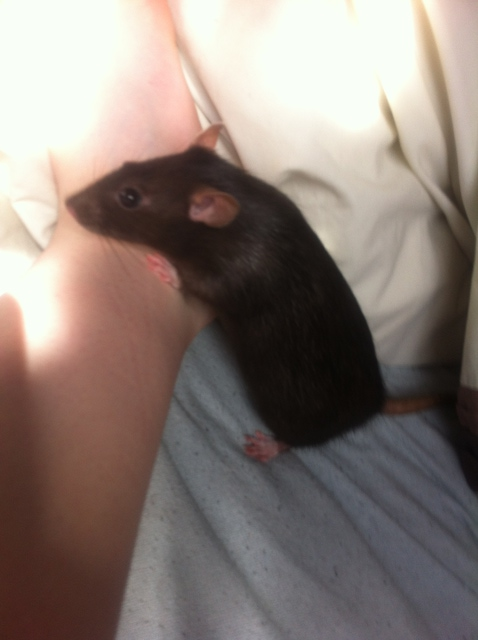 Rat Health
Question
Millie
Im quite concerned about my litt
Rat Health
Question
Millie
Im quite concerned about my litt
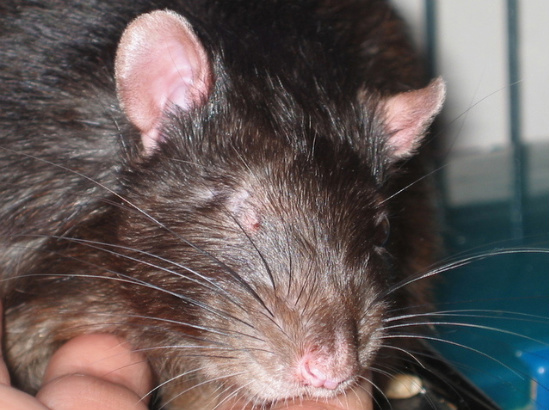 Bleeding eye
QuestionQUESTION: I have a blue male that is about 4 mo
Bleeding eye
QuestionQUESTION: I have a blue male that is about 4 mo
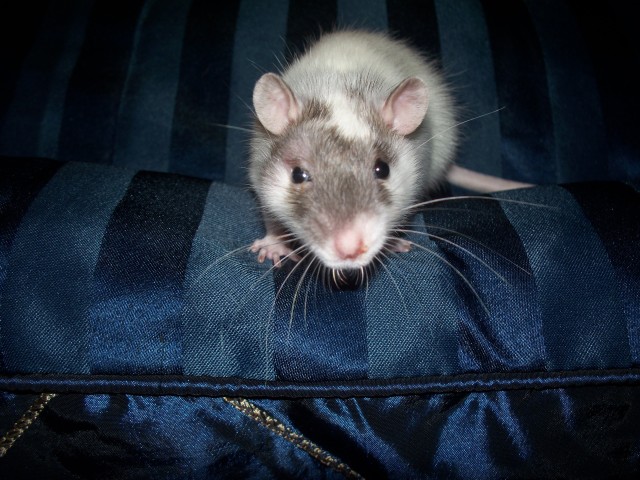 young male rat w/ face swollen around eye
Questionmy baby rat, Texas
QUESTION: A little ov
young male rat w/ face swollen around eye
Questionmy baby rat, Texas
QUESTION: A little ov
 Weird bumps
Question
bumps
Hello Im Teeona. Friskey my rat h
Weird bumps
Question
bumps
Hello Im Teeona. Friskey my rat h
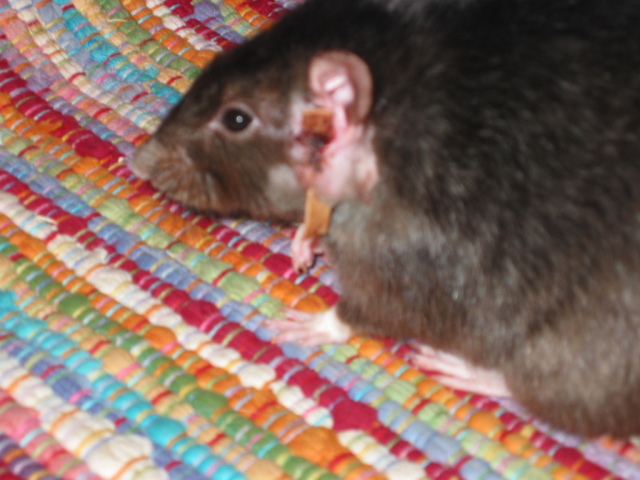 Rat with abcess & rat who has chewed out her stitches
QuestionQUESTION: I am having lots of problems recently
Rat with abcess & rat who has chewed out her stitches
QuestionQUESTION: I am having lots of problems recently